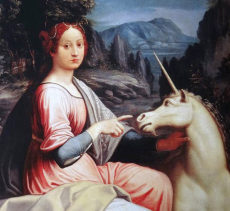Some of the more interesting references in the Bible to unicorns include the following.
God brought them out of Egypt; he hath as it were the strength of an unicorn (Numbers 23:22, KJV).
God brought him forth out of Egypt; he hath as it were the strength of an unicorn: he shall eat up the nations his enemies, and shall break their bones, and pierce them through with his arrows (Numbers 24:8).
Save me from the lion's mouth: for thou hast heard me from the horns of the unicorns (Psalm 22:21, KJV).
Will the unicorn be willing to serve thee, or abide by thy crib? Canst thou bind the unicorn with his band in the furrow? or will he harrow the valleys after thee? (Job 39:9 - 10, KJV).
The voice of the Lord breaketh the cedars; yea, the Lord breaketh the cedars of Lebanon. He maketh them also to skip like a calf; Lebanon and Sirion like a young unicorn (Psalm 29:5 - 6, KJV).
For, lo, thine enemies, O Lord, for, lo, thine enemies shall perish; all the workers of iniquity shall be scattered. But my horn shalt thou exalt like the horn of an unicorn: I shall be anointed with fresh oil (Psalm 92:9 - 10).
Other than the verses above, these mythical animals are also mentioned by name in Deuteronomy 33:17 and Isaiah 34:7.

This animals were known to be strong and fierce (Numbers 23:22, 24:8, Job 39:11). They could not be trusted (Job 39:12) and were known for being untamable (Job 39:9). They were also quite agile (Psalm 29:6). They possessed at least one horn (Psalm 92:10) and quite possibly two (Deuteronomy 33:17, Psalm 22:21).
In Numbers 23:22 and 24:8 these animals symbolize the power of God to deliver his people. In Isaiah 34, they symbolized the Eternal's judgment on the world for its sins.
Come near, ye nations, to hear; and hearken, ye people: let the earth hear, and all that is therein; the world, and all things that come forth of it. For the indignation of the Lord is upon all nations . . .
And the unicorns shall come down with them, and the bullocks with the bulls; and their land shall be soaked with blood . . . (Isaiah 34:1 - 2, 7 - 8).
These beasts can also represent the prophesied glory and power to come upon the descendants of Joseph (through his sons Ephraim and Manasseh - Deuteronomy 33:16 - 17). Many years after this prophecy was given, ten of Israel's twelve tribes were conquered by the Assyrians and taken captive.
These tribes (commonly referred to as the lost tribes of Israel) migrated to several European countries after the Babylonians conquered Assyria in 612 B.C. Ephraim migrated to what is today England. It is more than a coincidence that this legendary animal, symbol of God's special blessing, found its way into the national symbol of the United Kingdom.
What Is It?
Bible commentaries vary widely regarding what they think is the animal referenced as unicorns is actually referencing. They state it could be an extinct wild bull called the auroch (Barnes), a rhino (Jamieson, Fausset and Brown), a wild buffalo or ox (Keil & Delitzsch), a wild goat (Wesley) or even an antelope (Bullinger's notes).
Modern translations also vary in the way they translate the Hebrew word rame used for unicorns. For example, in Isaiah 34:7, the word is translated "oxen" in the NCV, "wild oxen" in the NIV, NASB and others, and "reems" in the YLT.
Legends
One medieval legend states that the horn of unicorns, if they touch the pool the animal is drinking from, renders the waters pure and sweet. According to the 1911 Encyclopedia Britannica, as late as 1789 the court ceremonial of France used instruments supposidly made from such horns for testing whether royal food contained poison (Volume 27, page 582).